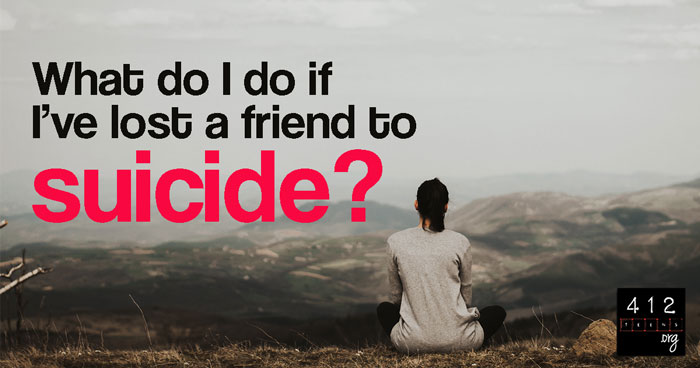How do I cope with the suicide of a friend or loved one?

Dear friend, the loss you are feeling right now is indescribable. Losing a loved one is always hard, but losing them to the tragedy of suicide adds even extra levels of pain. You may be experiencing guilt, confusion, anger, or shock. You may be experiencing emotions that are entirely separate from what you expected. No matter the pain you are in, please know that you are not alone.
Hebrews 5:15-16 says, "For we do not have a high priest who is unable to sympathize with our weaknesses, but one who in every respect has been tempted as we are, yet without sin. Let us then with confidence draw near to the throne of grace, that we may receive mercy and find grace to help in time of need." Jesus became human (Philippians 2:5-8), and in that humanity He experienced all the pain, grief, and loss that you are going through now. This is the same Jesus Who is listening to the cries of your heart, your confusion, and your anger, and Who seeks to comfort you (2 Corinthians 1:3-4).
Common Reactions to a Suicide
"Was it my fault?"
There is an unfortunate trend in media that has been using shame to raise awareness for the suicide epidemic, largely spurred on by the Netflix show 13 Reasons Why. This is a horrible way to raise awareness, as it puts the responsibility entirely on the survivors of a suicide to have prevented the death.
But your loved one's decision was their decision—and theirs alone.
Maybe you did all the things you're "supposed" to do by checking in on them, asking them directly about their mental state, listening to their heartache, encouraging them to seek counseling—maybe you even took them to counseling—and they still made the decision to end their life. Their decision is NOT your fault. You are in no way responsible for their decision—no matter how much you did or did not do.
"But they seemed so happy."
For many of us, it is difficult to distinguish between a suicidal person and a sad person. Many people go through seasons of depression, and not all depression leads to suicidality.
Additionally, there are very strong stigmas attached to discussing suicide and suicidal awareness. It's morbid and bleak, and it’s natural to want to avoid thinking about how common it is around the world. And when one of the common but unspoken signs of impending suicide is the person's sudden improvement in mood when they decide to end their life, it gets very confusing trying to understand the true path of a friend's heart. We may never learn what thought process led to their death.
One of the facets of grieving the loss is finding a way to come to terms with unanswered questions. No one person can ever understand another person's heart 100%, and it’s possible that you won't find the complete closure you're so desperate to feel right now.
"What am I supposed to do now?"
The death of a loved one always shifts the dynamic of your life. It's true that nothing will ever be the same. Losing that loved one to suicide has the added difficulty of stigmatized discussion and feelings of isolation. All of these feelings can lead you down your own path of despair, hopelessness, loneliness, and maybe even suicidal ideation.
It likely feels as though there will never be anything good in your life ever again. Maybe the loss was your dear friend you ate lunch with every day or a family member. Maybe the loss was someone you didn't know well, but they deeply influenced and changed your life in beautiful ways. Your grief is a valid part of your human experience regardless of your relationship to the deceased. The change in how life will look now is going to be hard, and that pain is also valid.
“Even when I walk through the darkest valley, I will not be afraid, for you are close beside me. Your rod and your staff protect and comfort me.” —Psalm 23:4
Don't Grieve Alone
Each person grieves differently, and you do not need to explain it to anyone you don't want to. But it is still important to have trusted people in your life to offer support. Maybe those people are mutual friends with your loved one. Maybe your trusted people are your parents, grandparents, a teacher, or a pastor.
Your trusted circle should respect when you need silence, but check on you to make sure you're okay. They shouldn't pressure you into doing things you're not comfortable with, but they will gently encourage you with light and beauty. They will "rejoice with those who rejoice, weep with those who weep" (Romans 12:15).
If you do not have people in your life whom you trust, then seek out a good counselor. Even if you do not want to talk to those close to you, you do need support and love to get through this. A good counselor will partner with you in your grief and help equip you with ways to process it in a healthy way.
And remember, God is with you every moment through this process (1 Peter 5:7). “He heals the brokenhearted and binds up their wounds” (Psalm 147:3).
Ready yourself for reminders.
You will likely experience emotional triggers that remind you of your lost one both in expected and unexpected ways. You may start crying when you walk into the store you worked at with them. Or perhaps they loved turtles, and you can't watch Finding Nemo anymore. Trauma and grief affect us all in deeply personal but diverse ways. And no matter the triggers, know that there is no shame in saying "no" to situations, events, and circumstances you know won't be healthy for your grieving process.
Healing takes time.
You will have good days, and you will have bad days. Grief doesn't follow a single uphill line of progress. There is no timeline or expectation for getting “over it.” You may never be “over it,” but each day you wake up and move forward to the next day is a step in the right direction (Ecclesiastes 3:1-17).
Keep taking those steps. Healing takes time. If you are discouraged over how long it feels your healing has been taking, then ask one of your inner circle people or counselor about how far you've come. They will likely have a more accurate and encouraging picture of your progress.
It's okay to continue with your life.
It may not feel like it today, but eventually you will find that you can miss your loved one and continue forward with your life. You are not betraying their memory by moving past the grief. This doesn’t mean you never cared, or that you're forgetting about them. Not at all.
It’s okay for you to have fun with friends. It’s okay for you to laugh again. It’s okay to go on adventures, make new friends, shop at that store again, and find whatever path God has designated for you to walk. It is okay for you to live again.
”The righteous cry out, and the Lord hears them; he delivers them from all their troubles. The Lord is close to the brokenhearted and saves those who are crushed in spirit.” —Psalm 34:17-18

Suicide Prevention: Seek Help Now
- Call 988 or text HOME to 741741 (US only)
- 988 Hotline (call, text, chat, deaf/HOH, y en espanol)
- Find a Helpline (International)
- National Hopeline Network: 1-800-SUICIDE
- National Child Abuse Hotline: 1-800-4-A-CHILD
- National Domestic Violence Hotline: 1-800-799-SAFE
- Rape, Abuse, and Incest National Network (RAINN): 1-800-656-HOPE
- The Trevor Project: 1-866-4-U-TREVOR


TL;DR
Losing a loved one to suicide is a crushing blow. You may be experiencing many emotions at once, but you are not alone in your pain. Jesus experienced all our pain, despair, and loneliness in His humanity (Hebrews 5:15-16; Philippians 2:5-8), and He will be there to comfort you as you grieve this loss (2 Corinthians 1:3-4). A person's decision to end their life is their decision alone; it is NOT your fault. You may never find answers to all your questions answered as to why, but that’s OK. Your pain, grief, and loss are all valid. Don't grieve alone; find an inner circle or a counselor to help you through this process (see: Romans 12:15-16). You will find painful reminders of your friend and have good days and bad days, but you ARE moving forward—even if it doesn't feel like it. It’s OK to continue with your life and find joy again.

Writer/Editor: September Grace
September is an avid film nerd from growing up on weekend trips to Universal Studios Hollywood. She is passionate about the intersections of Christian spirituality, faith, and storytelling in popular culture. Outside of 412teens and digging up obscure horror flicks from the 2000s, she works as a freelance developmental editor and acquisitions consultant while comforting her clingy feline floof, Faust, from the anxiety of existence.
